Top Rankings
Salem School District ranks among the top 20% of public school district in New Hampshire for:
Category
Attribute
Graduation Rate
Highest graduation rate (Top 20%)
Diversity
Most diverse schools (Top 1%)
Community Size
Largest student body (number of students) (Top 1%)
For the 2025 school year, there is 1 public middle school serving 772 students in Salem School District. This district's average middle testing ranking is 7/10, which is in the top 50% of public middle schools in New Hampshire.
Public Middle School in Salem School District have an average math proficiency score of 41% (versus the New Hampshire public middle school average of 37%), and reading proficiency score of 56% (versus the 49% statewide average).
Minority enrollment is 23% of the student body (majority Hispanic), which is more than the New Hampshire public middle school average of 15% (majority Hispanic).
Overview
This School District
This State (NH)
# Schools
8 Schools
156 Schools
# Students
3,556 Students
47,559 Students
# Teachers
293 Teachers
4,474 Teachers
Student : Teacher Ratio
12:1
12:1
District Rank
Salem School District, which is ranked within the top 50% of all 189 school districts in New Hampshire (based off of combined math and reading proficiency testing data) for the 2021-2022 school year.
The school district's graduation rate of 95% has stayed relatively flat over five school years.
Overall District Rank
#84 out of 189 school districts
(Top 50%)
(Top 50%)
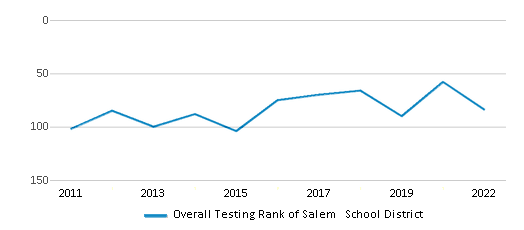
Math Test Scores (% Proficient)
46%
40%
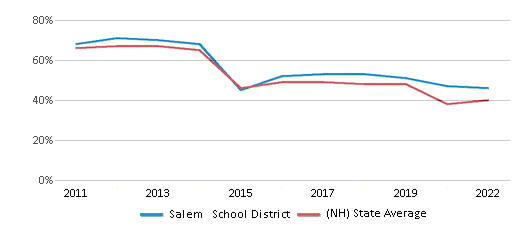
Reading/Language Arts Test Scores (% Proficient)
54%
51%
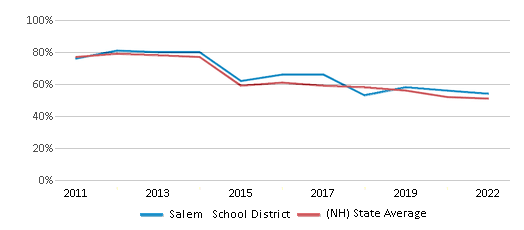
Science Test Scores (% Proficient)
36%
36%
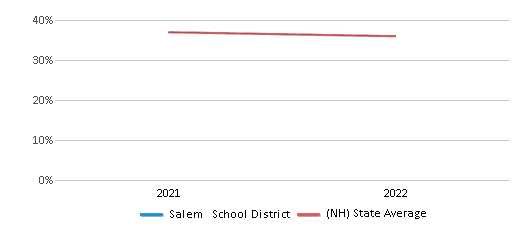
Graduation Rate
95%
88%
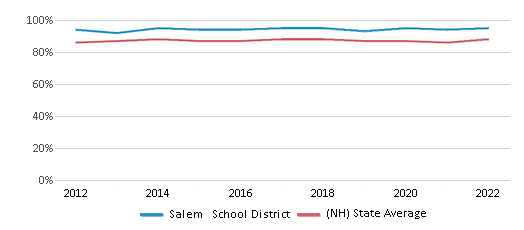
Students by Ethnicity:
Diversity Score
0.38
0.28
# American Indian Students
6 Students
75 Students
% American Indian Students
n/a
n/a
# Asian Students
123 Students
1,369 Students
% Asian Students
4%
3%
# Hispanic Students
404 Students
2,819 Students
% Hispanic Students
11%
6%
# Black Students
43 Students
818 Students
% Black Students
1%
2%
# White Students
2,780 Students
40,294 Students
% White Students
78%
85%
# Hawaiian Students
3 Students
34 Students
% Hawaiian Students
n/a
n/a
# Two or more races Students
197 Students
2,151 Students
% of Two or more races Students
6%
4%
Students by Grade:
# Students in PK Grade:
125
456
# Students in K Grade:
247
1,393
# Students in 1st Grade:
256
1,550
# Students in 2nd Grade:
269
1,543
# Students in 3rd Grade:
257
1,589
# Students in 4th Grade:
262
1,979
# Students in 5th Grade:
254
4,447
# Students in 6th Grade:
255
10,050
# Students in 7th Grade:
245
12,326
# Students in 8th Grade:
272
12,086
# Students in 9th Grade:
302
36
# Students in 10th Grade:
268
41
# Students in 11th Grade:
301
28
# Students in 12th Grade:
243
35
# Ungraded Students:
-
-
District Revenue and Spending
The revenue/student of $22,007 in this school district is less than the state median of $22,075. The school district revenue/student has stayed relatively flat over four school years.
The school district's spending/student of $20,606 is less than the state median of $21,293. The school district spending/student has stayed relatively flat over four school years.
Total Revenue
$78 MM
$3,646 MM
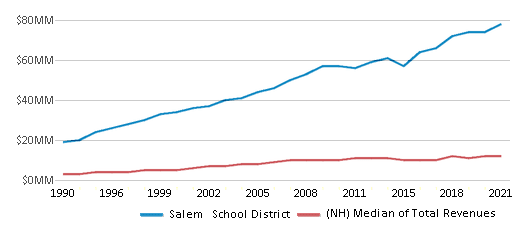
Spending
$73 MM
$3,517 MM
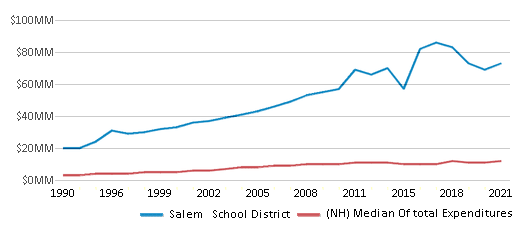
Revenue / Student
$22,007
$22,075
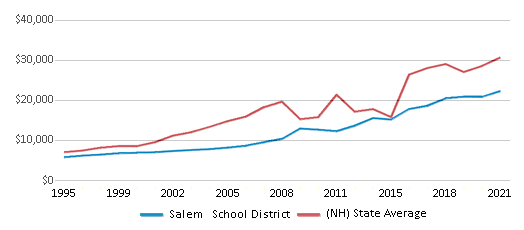
Spending / Student
$20,606
$21,293
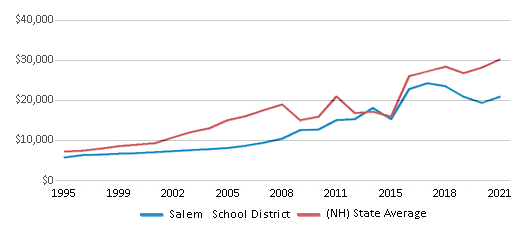
Best Salem School District Public Middle Schools (2025)
School
(Math and Reading Proficiency)
(Math and Reading Proficiency)
Location
Grades
Students
Rank: #11.
Woodbury School
(Math: 41% | Reading: 56%)
Rank:
Rank:
6/
Top 50%10
206 Main St.
Salem, NH 03079
(603) 893-7055
Salem, NH 03079
(603) 893-7055
Grades: 6-8
| 772 students
Recent Articles

Year-Round Or Traditional Schedule?
Which is more appropriate for your child? A year-round attendance schedule or traditional schedule? We look at the pros and cons.

Why You Should Encourage Your Child to Join a Sports Team
Participating in team sports has a great many benefits for children, there is no doubt. In this article you will learn what those benefits are.

White Students are Now the Minority in U.S. Public Schools
Increasing birth rates among immigrant families from Asia and Central and South America, combined with lower birth rates among white families, means that for the first time in history, public school students in the United States are majority-minority. This shift in demographics poses difficulties for schools as they work to accommodate children of varying language abilities and socio-economic backgrounds.





